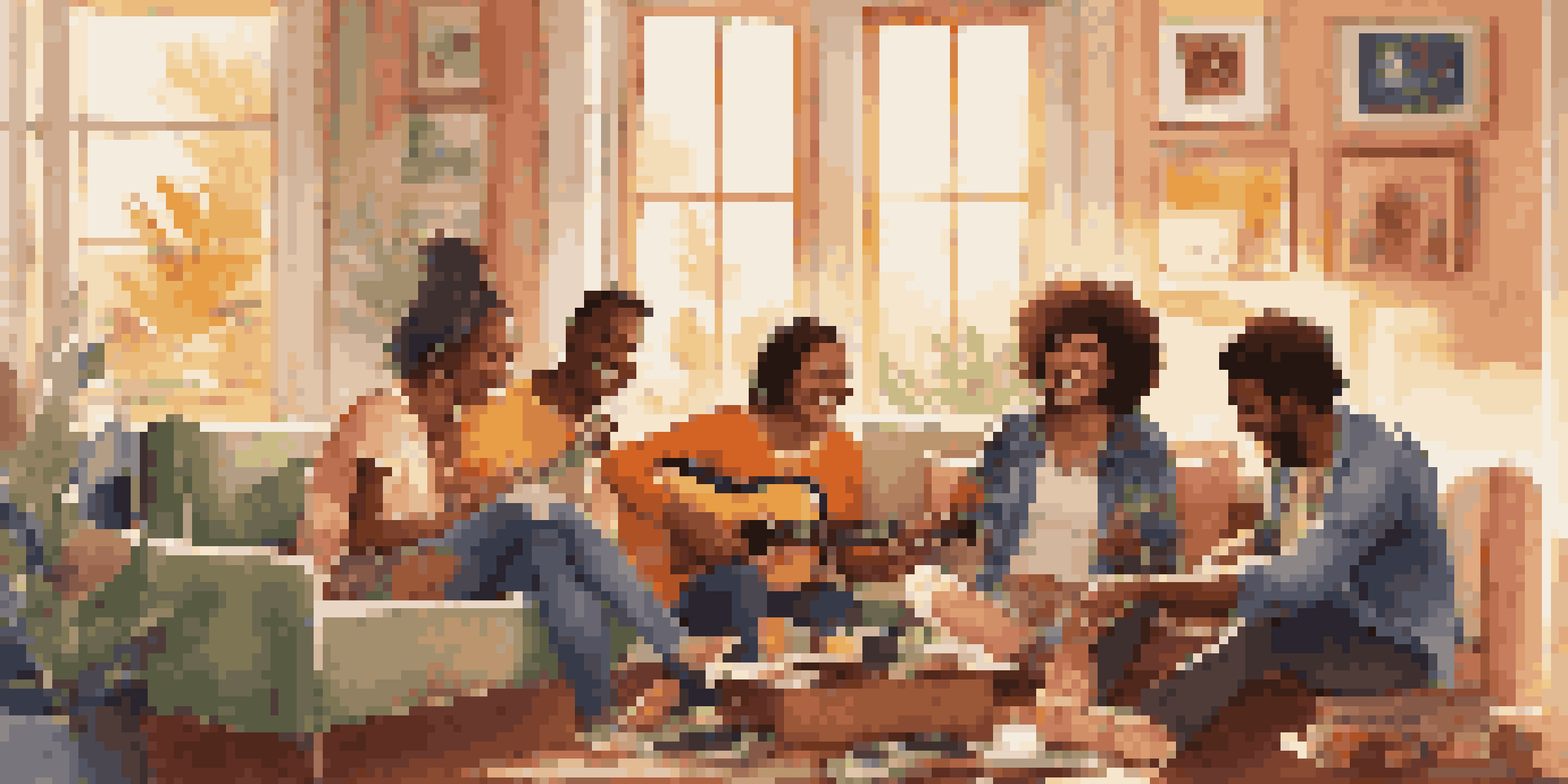The Role of Music in Strengthening Peer Relationships

Music as a Universal Language for Connection
Music has a unique ability to transcend cultural and linguistic barriers, acting as a universal language. This common thread can bring people together, creating shared experiences that foster deeper connections. Whether it's a catchy song on the radio or a powerful ballad at a concert, music creates moments where individuals can bond over their mutual appreciation.
Music can change the world because it can change people.
When friends share their favorite tracks or attend concerts together, it opens up avenues for discussion and exploration. These shared experiences can lead to memorable moments that strengthen relationships. Think of it as a bridge that connects people through rhythms and lyrics, encouraging conversations that might not happen otherwise.
Furthermore, music can evoke emotions and memories that can enhance friendships. A song that reminds two friends of a special moment can deepen their connection, allowing them to reminisce and reinforce their bond. Ultimately, music serves as a catalyst for forming and strengthening peer relationships.
Collaborative Music Activities Foster Teamwork
Engaging in collaborative music activities, like jamming in a band or singing in a choir, can significantly enhance teamwork skills. These experiences require communication, cooperation, and mutual respect—foundational elements of strong peer relationships. When individuals work together to create harmonious sounds, they learn to navigate challenges and celebrate successes as a team.

For example, consider a school band where students must listen to each other and adjust their playing to create a cohesive performance. This real-time collaboration not only improves musical skills but also teaches valuable lessons in patience and compromise. As band members face challenges together, they build trust and camaraderie, strengthening their friendships.
Music Bridges Cultural Gaps
Music fosters understanding and appreciation of diverse cultures, enhancing relationships among peers.
In essence, collaborative music-making serves as a practical exercise in relationship-building. It encourages people to engage with one another on a deeper level, cultivating a sense of belonging and shared purpose, which are vital for strong peer connections.
Music Events as Social Gatherings
Concerts, music festivals, and even casual listening parties are social events that draw people together. These gatherings create a festive atmosphere where individuals can mingle, share interests, and forge new connections. The excitement of live performances often acts as a social lubricant, making it easier for friends and strangers alike to strike up conversations.
Where words fail, music speaks.
Moreover, music events often cater to diverse audiences, bringing together people from various backgrounds. This melting pot of attendees provides a unique opportunity for individuals to meet others they might not encounter in their daily lives. Sharing the experience of live music can lead to spontaneous friendships based on common interests and newfound connections.
Ultimately, music events serve as excellent platforms for building social networks. They foster an environment where individuals can let their guard down, share their enthusiasm, and connect with others, making them pivotal in strengthening peer relationships.
Musical Tastes and Identity Formation
The music we listen to often reflects our identities and can influence how we connect with others. Sharing musical tastes can create a sense of belonging among peers who identify with the same genres or artists. This shared interest can serve as a foundation for friendships, as individuals bond over their favorite songs and discover new music together.
For instance, a group of friends who enjoy indie rock may attend concerts together, explore new bands, and discuss their favorite albums. Such activities provide opportunities for deeper conversations and understanding, allowing friendships to flourish. Music can often act as a conversation starter, leading to explorations of personal stories and experiences.
Collaborative Music Builds Bonds
Engaging in music-making activities strengthens teamwork and friendship by promoting communication and cooperation.
In this way, musical tastes help shape social circles and create common ground among peers. As individuals embrace their identities through music, they also invite others to share in their passions, fostering connections that can lead to lasting friendships.
Emotional Expression through Music
Music often serves as a powerful tool for emotional expression, allowing individuals to communicate feelings that words cannot convey. This shared experience of vulnerability can strengthen peer relationships, as friends feel more connected when they understand each other's emotions. By sharing songs that resonate with their feelings, individuals can foster empathy and support among their peers.
For example, a friend going through a tough time may share a poignant song that captures their feelings. This simple act can open the door to deeper conversations, helping friends provide support and understanding. When peers connect on an emotional level, they often form stronger bonds that can withstand the test of time.
Ultimately, music acts as a vehicle for emotional connection, enriching peer relationships. By expressing and sharing emotions through music, individuals create a space of trust and understanding, which is essential for nurturing strong friendships.
Music and Shared Experiences in Education
In educational settings, music often plays a critical role in creating shared experiences among students. Whether through music classes, performances, or school events, students engage with one another in ways that enhance their social interactions. These shared experiences foster a sense of community and belonging, which are vital for developing strong peer relationships.
For instance, participating in a school musical or talent show allows students to collaborate and support one another, often leading to lasting friendships. The teamwork involved in preparing for a performance can create bonds that extend beyond the stage, as students share the thrill of their hard work and achievements.
Shared Musical Experiences Unite
Attending music events together creates opportunities for social connections and lasting friendships.
In this context, music becomes more than just an art form; it becomes a means of building connections. By engaging in music-related activities, students learn to appreciate each other's talents, celebrate successes, and support one another, all of which contribute to stronger peer relationships.
The Role of Music in Cultural Understanding
Music is deeply intertwined with culture, and exploring different musical genres can enhance cultural understanding among peers. When individuals share music from their backgrounds, it opens up dialogues about traditions, values, and experiences. This exchange fosters appreciation and respect, paving the way for stronger relationships across diverse backgrounds.
For example, a friend sharing their cultural music during a gathering can spark curiosity and conversation. As peers learn about each other's musical traditions, they not only broaden their horizons but also find commonalities that strengthen their connections. This cultural exchange can create a richer understanding of one another, enhancing empathy and friendship.

Ultimately, music acts as a bridge to cultural understanding, enriching peer relationships. By embracing and celebrating diverse musical traditions, individuals can cultivate a more inclusive and connected community.